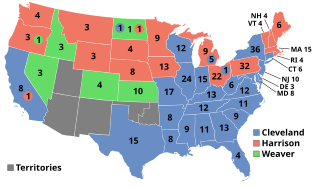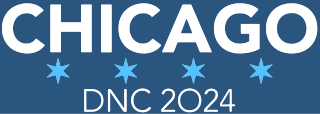
The 1892 United States presidential election was the 27th quadrennial presidential election, held on Tuesday, November 8, 1892. In the fourth rematch in American history, former Democratic President Grover Cleveland defeated incumbent Republican President Benjamin Harrison. Cleveland's victory made him the first and, to date, the only person in American history to be elected to a non-consecutive second presidential term. It was also the first of two times incumbents were defeated in consecutive elections—the second being Jimmy Carter's defeat of Gerald Ford in 1976, followed by Carter's subsequent loss to Ronald Reagan in 1980. It was the first election since 1856 in which one former president ran against the incumbent president, an event not repeated until 1912.

Elihu Benjamin Washburne was an American politician and diplomat. A member of the Washburn family, which played a prominent role in the early formation of the United States Republican Party, he served as a congressman from Illinois before and during the American Civil War. He was a political ally of President Abraham Lincoln and General Ulysses S. Grant. During Grant's administration, Washburne was the 25th United States Secretary of State briefly in 1869, and was the United States Minister to France from 1869 to 1877.

DeWitt Clinton Cregier was an American engineer and politician. He served as Mayor of Chicago, Illinois (1889–1891) for the Democratic Party.

Hempstead Washburne was a Republican attorney and politician from Illinois who served as Mayor of Chicago from 1891 to 1893. He was the son of United States Secretary of State Elihu B. Washburne.
The 1892 Democratic National Convention was held in Chicago, Illinois, from June 21 to 23, 1892. and nominated former President Grover Cleveland, who had been the party's standard-bearer in 1884 and 1888. This marked the last time a former president was renominated by a major party. Adlai Stevenson I of Illinois was nominated for vice president. The ticket was victorious in the general election, defeating the Republican nominees, President Benjamin Harrison and his running mate, Whitelaw Reid.

The 1888 Republican National Convention was a presidential nominating convention held at the Auditorium Building in Chicago, Illinois, on June 19–25, 1888. It resulted in the nomination of former Senator Benjamin Harrison of Indiana for president and Levi P. Morton of New York, a former Representative and Minister to France, for vice president. During the convention, Frederick Douglass was invited to speak and became the first African-American to have his name put forward for a presidential nomination in a major party's roll call vote; he received one vote from Kentucky on the fourth ballot.

In the Chicago mayoral election of 1905, Democrat Edward F. Dunne defeated Republican John Maynard Harlan and Socialist John Collins.

In the Chicago mayoral special election of 1893, John Patrick Hopkins was elected mayor. The election was triggered by the assassination of mayor Carter Harrison Sr.. Following Harrison's death, Republican George Bell Swift had been appointed by City Council to serve as acting mayor until the special election could be held. In the election, which was held December 19, Hopkins narrowly defeated Swift by a half-percent margin.

In the Chicago mayoral election of 1893, Democrat Carter Harrison Sr. won election, returning him the mayor's office for a (then-record) fifth non-consecutive term as mayor of Chicago. Harrison won a majority of the vote, defeating the Republican nominee, businessman Samuel W. Allerton, by a ten point margin. He also defeated two third-party candidates: United Citizens nominee DeWitt Clinton Cregier and Socialist Labor Party nominee Henry Ehrenpreis, neither of whom received strong support.

In the Chicago mayoral election of 1907, Republican Fred A. Busse defeated Democratic incumbent Edward F. Dunne.

In the Chicago mayoral election of 1915, Republican William Hale Thompson defeated Democrat Robert Sweitzer.

In the Chicago mayoral election of 1919, Republican William H. Thompson won reelection, winning a four way race against Democrat Robert Sweitzer, independent candidate Maclay Hoyne, and Cook County Labor Party candidate John Fitzpatrick. Sweitzer was the incumbent Cook County clerk, while Hoyne was the incumbent Cook County state's attorney. Fitzpatrick was a trade unionist.

In the Chicago mayoral election of 1897, Democratic nominee Carter Harrison Jr. was elected, winning a majority of the vote and defeating independent Republican John Maynard Harlan, Republican nominee Nathaniel C. Sears, independent Democrat Washington Hesing, as well as several minor candidates. Harrison carried a 26.7 point lead over second-place finisher Harlan, a margin greater than Harlan's vote share itself.

In the Chicago mayoral election of 1899, Democrat Carter Harrison Jr. was reelected, winning a plurality of the vote and defeating Republican nominee Zina R. Carter, former Illinois governor John Peter Altgeld, as well as several minor candidates by a double-digit margin.

In the Chicago mayoral election of 1901, Democrat Carter Harrison Jr. was reelected to a third term, defeating Republican nominee Elbridge Hanecy by a 9.5% margin of victory.

In the Chicago mayoral election of 1903, Democrat Carter Harrison Jr. was reelected to a fourth term, defeating Republican nominee Graeme Stewart.

In the Chicago mayoral election of 1889, Democrat DeWitt Clinton Cregier defeated incumbent Republican John A. Roche, winning a majority of the vote and a margin of victory in excess of ten percent.

The Chicago mayoral election of 1887 saw Republican John A. Roche win by a landslide, receiving more than a two-thirds majority of the vote, defeating Socialist Robert S. Nelson by more than 36 points, in a race where the Democratic Party had failed to field a candidate.

In the Chicago mayoral election of 1879, Democrat Carter Harrison Sr. defeated both Republican Abner Wright and socialist Ernst Schmidt in a three-way race. Harrison had a nearly nine point margin of victory.

The 2024 Democratic National Convention is a presidential nominating convention in which delegates of the United States Democratic Party will select the party's nominees for president and vice president in the 2024 United States presidential election. It is scheduled to be held August 19 to 22, 2024, at the United Center in Chicago, Illinois.













